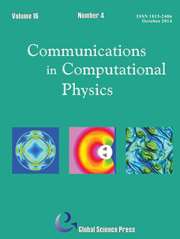Crossref Citations
This article has been cited by the following publications. This list is generated based on data provided by Crossref.
Martín-Vaquero, J.
and
Kleefeld, B.
2016.
Extrapolated stabilized explicit Runge–Kutta methods.
Journal of Computational Physics,
Vol. 326,
Issue. ,
p.
141.
Asante-Asamani, E.O.
Kleefeld, A.
and
Wade, B.A.
2020.
A second-order exponential time differencing scheme for non-linear reaction-diffusion systems with dimensional splitting.
Journal of Computational Physics,
Vol. 415,
Issue. ,
p.
109490.
KORKUT UYSAL, Sıla Övgü
and
ÇİÇEK, Yeşim
2021.
Numerical solution of the brusselator model by time splitting method.
Cumhuriyet Science Journal,
Vol. 42,
Issue. 1,
p.
75.
Wu, Chunya
Feng, Xinlong
He, Yinnian
and
Qian, Lingzhi
2023.
A second-order Strang splitting scheme with exponential integrating factor for the Allen–Cahn equation with logarithmic Flory–Huggins potential.
Communications in Nonlinear Science and Numerical Simulation,
Vol. 117,
Issue. ,
p.
106983.
Abbaszadeh, Mostafa
Khodadadian, Amirreza
Parvizi, Maryam
and
Dehghan, Mehdi
2024.
Investigation of combustion model via the local collocation technique based on moving Taylor polynomial (MTP) approximation/domain decomposition method with error analysis.
Engineering Analysis with Boundary Elements,
Vol. 159,
Issue. ,
p.
288.
Asante-Asamani, E.O.
Kleefeld, A.
and
Wade, B.A.
2025.
A fourth-order exponential time differencing scheme with dimensional splitting for non-linear reaction–diffusion systems.
Journal of Computational and Applied Mathematics,
Vol. 465,
Issue. ,
p.
116568.


